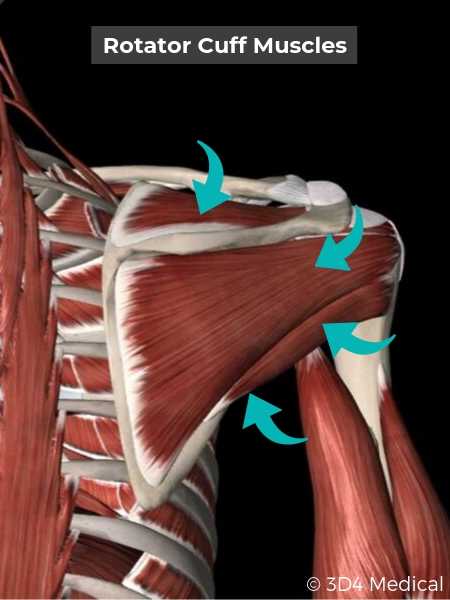What is a Rotator Cuff Injury?
Rotator cuff injuries are one of the most common complaints of shoulder pain. The rotator cuff is made up of 4 muscles; the supraspinatus, infraspinatus, subscapularis and teres minor; not only do these muscles stabilize and protect the joint but they are essential in any shoulder movement.

We generally class rotator injuries into 2 categories: degenerative and traumatic.
There are many conditions that can occur in the shoulder including tendonitis and bursitis (inflammation), strains or tears in the muscles and ligaments, frozen shoulder and instability.
Where Do You Feel Rotator Cuff Injury?
- Depending on the severity of rotator cuff injury symptoms can range from a dull ache to a sharp pain deep in the shoulder joint.
- Joint swelling and stiffness
- Difficulty lying on the injured shoulder.
- Pain with overhead movements or reaching behind your back
- The affected arm will often feel weak.
What Causes Rotator Cuff Injury?
The glenohumeral joint, or shoulder, is one of the most mobile joints in the human body; as a result a trade-off exists between having an extremely mobile joint and maintaining stability to avoid strains or injury.
There are multiple ways in which the rotator cuff can be damaged including trauma e.g. a fall, heavy lifting, overuse and repetitive overhead movements, degeneration, muscle imbalance; the list goes on.
Overloading heavy shopping bags can strain and damage the muscles, predisposing them to weakness and tears.
What are the Symptoms of Rotator Cuff Injury?
Again, this depends on the condition but common symptoms of rotator cuff pathology include:
- Pain and swelling in the shoulder
- Tenderness to touch
- Redness or heat in the area
- Pain moving the affected arm, especially reaching behind and abducting the arm.
- Clicking or crunching when lifting your arm
- Stiffness
- Difficulty sleeping on the affected shoulder
- Loss of strength in the affected arm
- Neck or upper back pain
- Pain that runs down the arm
- Pain usually worse at night
- Chronic rotator cuff tear
What Are Contributing Factors To Rotator Cuff Injury?
- Degeneration
- Age
- Overuse i.e. certain sports such as tennis or swimming
- Occupation
- Weak or tight muscles
- Muscle imbalance
- Decreased mobility in the thoracic or cervical spine
- Poor posture
- Carrying heavy bags and favoring shoulder
The link between reusable bags and rotator cuff injury:
The war on waste and efforts to eliminate single use plastic bags has been rejoiced by many- however something we are seeing more prevalently in clinic is shoulder and rotator cuff injuries which may be linked to overloading reusable bags at the check out.
What Else Could Be Similar To Rotator Cuff Injury?
Rotator cuff strains or tears can be similar to:
- Bursitis
- Glenoid Labrum Tears
- Cervical nerve root injury or radiculopathy
- Bicep tendonitis
- Adhesive capsulitis (frozen shoulder)
- Thoracic Outlet Syndrome
- Acromioclavicular joint injury
How is Rotator Cuff Injury Diagnosed?
Your Osteopath will take a thorough case history to identify where the pain is coming from as well as any predisposing factors.
A clinical examination will be conducted including active and passive range of motion and special tests to reproduce symptoms.
We may also refer you off for imaging including X-ray, MRI or ultrasound.
What Are The Standard Treatments For Rotator Cuff Injury?
Dry needling, joint mobilization, stretching and strengthening of the rotator cuff and surrounding muscles, soft tissue therapy to reduce any strains and take load off particular structures as well as taping.
What Are The Alternative Treatments For Rotator Cuff Injury?
Non-surgical therapies may include the use NSAIDS and application of heat and cold.
Depending on the severity of the injury corticosteroid injections can be used to decrease inflammation however it should be noted that this is short-term solution, with varied effectiveness and risk factors to consider.
Surgery may be required as a last resort if there is a significant tear or all conservative approaches have been exhausted.
Self Help for Rotator Cuff Injury – Things You Can Do Yourself:
- Be mindful when filling up your shopping bag; ensure they are at a comfortable weight and not straining the neck or shoulders.
- Preparation is key: Ensure you have enough bags before going to the supermarket to avoid over filling. If in doubt, buy an extra bag.
- Lower resistance exercises to strengthen the shoulder muscles and regular stretching as well as warming up your body before exercise may prevent injury.
When would you see an Osteopath about Rotator Cuff Injury?
As managing shoulder pain can be a long and difficult process it is essential to get on top of it early; if you are experiencing any of the above symptoms book in to see one of the osteopaths who can assist in the diagnosis and management of the problem.
